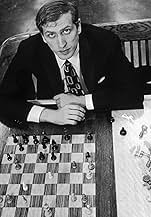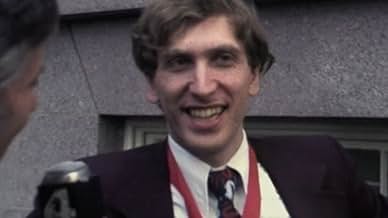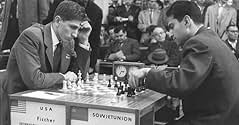'Bobby Fischer Against the World' is a documentary feature exploring the tragic and bizarre life of the late chess master Bobby Fischer. The drama of Bobby Fischer's career was undeniable, f... Read all'Bobby Fischer Against the World' is a documentary feature exploring the tragic and bizarre life of the late chess master Bobby Fischer. The drama of Bobby Fischer's career was undeniable, from his troubled childhood, to his rock star status as World Champion and Cold War icon, t... Read all'Bobby Fischer Against the World' is a documentary feature exploring the tragic and bizarre life of the late chess master Bobby Fischer. The drama of Bobby Fischer's career was undeniable, from his troubled childhood, to his rock star status as World Champion and Cold War icon, to his life as a fugitive on the run. This film explores one of the most infamous and myste... Read all
- Nominated for 1 Primetime Emmy
- 1 win & 5 nominations total
- Self
- (archive footage)
- Self
- (as Dr. Anthony Saidy)
- Self
- (archive footage)
- Self
- (archive footage)
- Self
- (archive footage)
- Self
- (as Fernand Gobet PhD)
Featured reviews
The key historical event that the film revolves around is the 1972 World Championship against the Soviet grandmaster Boris Spassky. This dramatic confrontation hosted in Iceland had huge political significance seeing as it set the American against a Russian at the height of the cold war. As a result it was probably the most internationally famous chess match ever played. Even at this early stage, however, Fischer's erratic behaviour is quite evident. He almost never made it in the first place due to his own personal demons, when finally there he arrived absurdly late and then proceeded to complain about the hum of the TV cameras. You might find yourself wishing that the dignified Spassky actually defeated this highly strung man. But this is partially why this documentary is an interesting one, as its central character is not particularly likable at all. There is very little actual footage of Fischer; he remains a very enigmatic figure. After the Spassky match less and less is seen of him, so much so that his next public appearance in a match in Yugoslavia occurs the best part of twenty years later. In agreeing to this he contravenes international law, seeing as this country was in the midst of a terrible war. The sight of Fischer publicly spitting on the letter warning him that he would be breaking international law is a grim one indeed; the years that followed until his death in 2008 seem to be equally mysterious and sad.
Bobby Fischer Against the World is a very good documentary about a troubled man who was destroyed by the only thing he loved. The documentary states that he was the greatest player there ever was. Personally I think this is a somewhat romantic statement based mostly on the drama of his ascent. But for sure, he was one of the most fascinating chess players that ever lived and in many respects remains an enigma still.
This historical event is dramatically recounted in Liz Garbus' new documentary, Bobby Fischer Against the World. The film explores the rise and fall of the chess world's bad boy: from a poor, self-taught child prodigy to a venerated world champion and, finally, a reviled paranoiac. The film divides Fischer's life into three parts, with the middle centring on that famed 1972 match in Reykjavik.
The trajectory that the film traces is rather clichéd, but along the way it does raise a number of intriguing questions: What is the nature of genius? What does it take to make a champion? What are the causes of mental illness? The film hints at how the young Bobby Fischer was affected by growing up without a father and being raised by a lefty mother in a poor Brooklyn household at the height of red-baiting. It looks at how fame affected Fischer, a recluse who cherished privacy, and it explores the nature of the game of chess itself, the mental as well as physical stamina it requires. The film also shows how Bobby and Boris became pawns (if willing ones) in the Cold War stand-off between the US and the USSR.
Considering its wide scope, it is neither surprising nor disappointing that Bobby Fischer Against the World raises more questions than it answers. Garbus largely leaves it to the viewer to draw their own conclusions about what to make Fischer's life and personality. The documentary intersperses newsreel footage, still images by photographer Harry Benson (who was granted unique access to Fischer), and talking heads that include Henry Kissinger, Fischer's brother-in-law, his chess contemporaries, various fans and historians.
One of the interviewees refers to Fischer as 'the Mozart of chess'. Indeed, he started teaching himself the game at the age of six, spending all his free time studying strategies and playing against himself. Just a few years later he was frequenting chess clubs in Manhattan and soon he was taking on up to 40 adults at a time. At 14, he became the youngest US Open Champion ever.
By contrast, Spassky's home country was a place that talent-spotted, honed and coached their chess players. In the Soviet Union, chess was not just a sophisticated boardgame, but a matter of collective, national pride.
So when the two players went up against each other in Iceland, the match was loaded with symbolism. As another chess grandmaster, Garry Kasparov, says in the film, Fischer was 'representing the entire free world'. At the time, an American TV news bulletin put the latest news about Fischer above the Watergate scandal and soaring unemployment in the US. And when the notoriously demanding and elusive chess champion at first failed to show up in Iceland, Kissinger himself called Fischer up, urging him to go.
In an interview after his World Championship win, Fischer said he felt like something had been taken out of him. Having achieved the ultimate accolade, Fischer became more and more of a recluse and failed to defend his title three years later. For the chess world, this was a great betrayal.
Fischer only resurfaced for a bizarre 'comeback' 20 years later in a 1992 re-match against Spassky in the former Yugoslavia, which was then under United Nations sanctions. Fischer ended up winning the rematch, but the price was high. He was indicted by the United States for defying a presidential ban against commercial dealings with Yugoslavia, facing fines and a 10-year prison sentence if he returned. His old friend and bodyguard managed to secure him citizenship in Iceland, where he died in 2008.
When he returned to the public eye in 1992, Fischer was wild-haired, podgy and virulently anti-Semitic. Although both his parents were Jews, Fischer got mired in conspiracy theories, reading pamphlets about the Illuminati and The Protocols of the Elders of Zion. In a radio phone-in just after 9/11 he gloated over the Twin Tower attacks. Having been paraded in front of cameras as an American hero as a child, and taken pride in beating the Russians as a young man, at the end of his life Fischer was an outcast and a self-made enemy of the state.
Bobby Fischer Against the World suggests that there is something about the game of chess that not only attracts, but also contains or focuses great minds. As an interviewee in the documentary notes 'A good chess player is paranoid on the board, but then if you take that paranoia to real life it doesn't play so well'. Once chess was no longer his sole obsession, Fischer seems to have begun to imagine that there were some hidden strategies behind people's every move. And he is not the only who comes off as paranoid in the film. In the course of the 21 individual games that Fischer and Spassky played during those three summer months in Iceland, Spassky claimed that his opponent was using electronic and chemical devices to control and unsettle him. A thorough police search of the room where the match took place failed to find any such devices.
In the end, Garbus' film makes no excuses for Fischer's despicable views while at the same time showing that, regardless of his disappointing private ending, Fischer's remarkable achievements still remain an inspiration.
Bobby Fischer is this brilliant chess player coming out of Brooklyn and literally living the American dream. He starts playing at 6 years old, quickly outshining players in his categories, reaches a moment when he fights the Russian chess world champion in the height of the cold war and wins, thus making popular the game of chess even in an anti- intellectual country as the US and revolutionising the game of chess itself.
Alas, soon after he pretty much goes insane, with bouts of paranoia and psychosis and ridiculous antisemitism (he was Jewish himself). The greatest win of the chess world was in the same time its greatest loss. It is painful to watch this great mind shrink and die under the weight of mental illness. The film is merciless in displaying it and does as much in bringing forth the legend of the greatest chess player of all time as it does to totally demolish it in the end. It is one of those stories where you would wish for the main character to die right after he wins the world championship. Too sad.
As for the chess itself, there was none. It is strictly a layman's story, about Bobby the man and of the people around him and the human footprint of his existence.
Some say Fischer was the greatest of all players, and there's much evidence to believe the claim. He became the US number one at 15, and bruised the Soviet Union by beating their star man, Boris Spassky. A whole host of current and former chess legends line up in this documentary to declare Fischer the King.
The documentary suggests Fischer was at war with the world, but I think his main enemy was himself. Those inner demons – being told not to advertise his Jewishness, not having a consistent father figure, having fame thrust upon him, being a pawn in Kissinger's government – were lodged in his mind, like the thousands of chess combinations he accumulated since he was six.
Like all good documentaries, this one presents the good and the bad. Fischer's anti-Semitism is on unexpurgated show, as is footage suggesting how others were the cause of his downfall. (The US, his country of birth, first regarded him a national treasure, but later denied him citizenship.) The documentary also does well when expressing the grandeur of chess, and explaining why so many grandmasters over centuries have died or gone mad in their vain quest to discover the secrets of chess.
Even intelligent people I know don't appreciate that chess has no boundaries. 'It's just a game' goes the usual cry. It may be. But it is an infinite game. It is said that its 32 pieces and 64 squares make it possible for there to be a number of possible combinations greater in total than the number of atoms in the universe. It's a game no mortal will ever be able to conquer. Chess is the ultimate victor.
The final line in the documentary, spoken by Fischer, almost made me cry because of the dignified and unemotional way he delivers it. 'Do you think you had a good upbringing?' a faceless reporter asks him. 'It was okay. Could have been more rounded.' There was never a genius without a tincture of madness. In Bobby Fischer's case it was, alas, slightly more than a tincture.
www.scottishreview.net
Bobby cut his teeth, as it were, at the home of the Collins's, spending an inordinate amount of spare time with them as a young child. In their home, he learned from Jack -- a New York State Champion, an editor of "Modern Chess Openings," (America's leading précis on opening play), a respected Correspondence Chess player, and the dean of American Chess Teachers -- and he received needed motherly sustenance from Jack's sister Ethel.
The Rev. William Lombardy was Fischer's "second" in Reykjavik. It is he who fought the battles for Bobby with the administrators and the arbiters. By his doing so, Bobby could stay somewhat in the background getting his needed rest. The tension and responsibilities lay on the broad shoulders of the Rev. Lombardy, who did a magnificent job on the front lines acting for the Mercurial Mr. Fischer. The full story of Bobby Fischer cannot be adequately told without these three Fischer companions making some contribution to his film life.
Given these three omissions one has the right to ask why Susan Polgar is represented as a Fischer expert. She was but three years old when the Fischer-Spassky match was played, and though she may have had later social connection with him, it is wrong to present her in the role she plays.
One can wonder too how Sam Sloan was chosen to give his views of Fischer. His knowledge of Fischer is a distant one at best.
Plaudits, though, are due for the in-depth interviews of Larry Evans and Tony Saidy, two who knew Bobby well. The same may be said of Asa Hofmann, to this day a legend in New York chess circles.
Did you know
- TriviaThough Bobby Fischer hated Soviet players for what he considered collusion i.e. drawing matches between themselves so they could concentrate on beating non-Soviet players like Fischer, Bobby Fischer liked and respected Boris Spassky. In turn, Spassky returned the affection and esteem.
- Quotes
Larry Evans - Former Champion: Reportedly, Fischer's last words were: "Nothing is so healing as the human touch".
- ConnectionsFeatured in Ebert Presents: At the Movies: Episode #1.20 (2011)
- SoundtracksTheme from Shaft
Words and Music by Isaac Hayes
Published by Irving Music, Inc. (BMI)
Performed by Isaac Hayes
Courtesy of Stax Records
By arrangement with Concord Music Group, Inc.
- How long is Bobby Fischer Against the World?Powered by Alexa
Details
- Release date
- Countries of origin
- Official sites
- Languages
- Also known as
- Bobby Fischer: Genius and Madman
- Filming locations
- Production companies
- See more company credits at IMDbPro
Box office
- Gross worldwide
- $90,511
- Runtime
- 1h 33m(93 min)
- Color
- Aspect ratio
- 1.78 : 1































